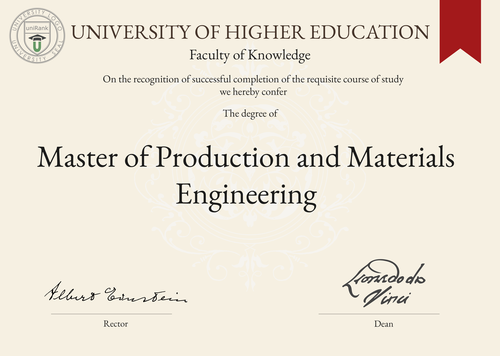
Master of Production and Materials Engineering (M.P.M.E.)
Guide to Master of Production and Materials Engineering Program/Course/Degree
Master of Production and Materials Engineering (M.P.M.E.)

Program Name:
Master of Production and Materials EngineeringProgram or Degree abbreviation:
M.P.M.E.Duration range:
The duration of the program typically ranges from 1 to 2 years.Tuition range:
The tuition fees for the program can vary depending on the chosen country or university. It is recommended to check with specific institutions for accurate information.Overview:
The Master of Production and Materials Engineering program is designed to provide students with advanced knowledge and skills in the field of production and materials engineering. It focuses on the efficient and effective production of goods and services, as well as the development and application of materials for various industries.Curriculum Overview by year:
The curriculum of the program is structured to cover both theoretical and practical aspects of production and materials engineering. The coursework is typically divided into different modules or subjects, which are spread across the duration of the program. The specific curriculum may vary depending on the university and country.Key Components:
The key components of the program include studying topics such as production planning and control, materials selection and processing, quality management, supply chain management, industrial automation and advanced manufacturing technologies. Students may also have the opportunity to engage in research projects or internships to gain hands-on experience.Career Prospects:
Graduates of the Master of Production and Materials Engineering program can pursue various career paths in industries such as manufacturing, automotive, aerospace, energy, electronics and consulting. They may work as production engineers, materials engineers, quality assurance managers, supply chain analysts, or research and development specialists.Salary Expectations:
The salary expectations for graduates of the program can vary depending on factors such as the country, industry, job role and level of experience. It is advisable to research specific salary data for the desired location and field. For a more accurate understanding of salary expectations, you can utilize the Job Sites Search Engine, from our sister site jobRank, which searches over 4,600 job sites worldwide. Make sure to specify not only the job title but also the country you are interested in.Conclusions:
It is important to note that the duration, tuition fees, curriculum, key components, career prospects and salary expectations of the Master of Production and Materials Engineering program can vary depending on the chosen country or location of study, as well as the university. Prospective students are encouraged to explore different options and consider their individual preferences and goals. Visitors can search for institutions offering this specific degree, Master of Production and Materials Engineering, anywhere in the world through the uniRank World Universities Search Engine.World Universities Search Engine
search for Master of Production and Materials Engineering (M.P.M.E.) and add the Location (country, state etc.) or specific University you are interested in studying at.
Query examples:
- Master of Production and Materials Engineering (M.P.M.E.) United States
- Master of Production and Materials Engineering (M.P.M.E.) United Kingdom online
- Master of Production and Materials Engineering (M.P.M.E.) Australia international students
- Master of Production and Materials Engineering (M.P.M.E.) University of California
- Master of Production and Materials Engineering (M.P.M.E.) University of London tuition fees
- Master of Production and Materials Engineering (M.P.M.E.) University of Sydney scholarships
Share Program/Course
Interesting? Share this program/course/degree info with your friends now.